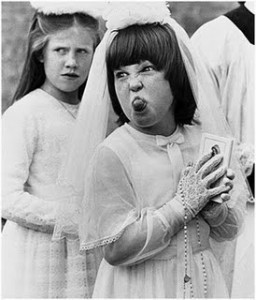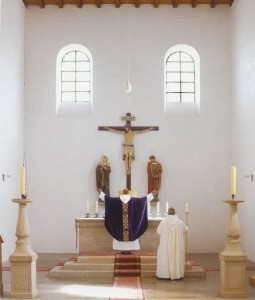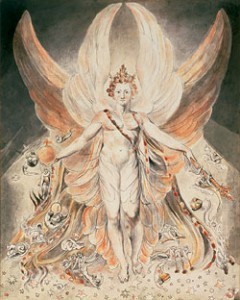Dwight Longenecker's Blog, page 295
March 23, 2012
Lucifer in Lent
Caitlin O'Rourke on Lent
 Guest blogger Caitlin O'Rourke is a member of St Bridget's, Church, High Dudgeon, New Jersey. Caitlin is ten years old.
Guest blogger Caitlin O'Rourke is a member of St Bridget's, Church, High Dudgeon, New Jersey. Caitlin is ten years old.
Yesterday after school we went to Grandma's grave in the cemetery after Mass which was for her anniversary and we took flowers and trimmed the grass over her grave and the red tulip I planted has come up and I told Flora that I planted the red tulip because it was the flower that reminded me of the cherry Tootsie pops that Grandma always used to save for me but I haven't had any because I gave up candy for Lent again this year and you'll never believe this but Flora asked Jimmy Pochowski what he gave up for Lent and he told Flora that he gave up bacon and hamburgers for Lent and Flora didn't believe him but Arnold said it was true and even if Jimmy Pochowski calls me Fatty Catty I think it is pretty good that he gives up hamburgers and bacon for Lent so anyway after we went to Grandma's grave and I saw the red tulip we stopped at the drive in to get some lunch and you'll never believe it but Jimmy Pochowski was in there and it was a Friday and everything and he was eating a big huge hamburger so I went over to him and asked him what he was doing eating a hamburger on a Friday in Lent and he told me to mind my own business and I could see he was really mad at me and his mom's eyes were red like she was crying so I maybe they were fighting because Jimmy was bad again like he always is and he makes his Mom cry all the time because he gets detentions and one time he even put an envelope full of dog mess on Sister's chair and she at on it and it squooshed on her habit and smelled really bad and him and Arnold almost got expelled so when I saw Father Florsheim I told him I saw Jimmy eating a big bacon cheeseburger in Burger King and Father Florsheim didn't even care and told me that I shouldn't judge Jimmy and maybe there were other things I didn't know and he seemed mad at me too and Father Florsheim is always nice to everybody so when I got home I felt bad and told Mom what happened and then she was crying too and it's like everybody is mad at me and sad and crying and I don't even know why so she made me sit down and told me that Jimmy is very sick right now and the doctor told him he had to eat more or his stomach would get more sick so I went to my room and just sat there and now I feel like Our Lord in the Wilderness and I think Mom is mad at me too and Flora doesn't even know so I think I am going to go to adoration with Dad tonight and light a candle before the Blessed Mother and the Infant of Prague because Father Florsheim says that is the child Jesus and children should pray to him more and I will say the rosary for for Jimmy and Mrs Pochowski because maybe that is why she was crying.
Sacraments and Sanity
 Someone commented on my blog saying that organized religion was for weak, shallow, frightened people because we are all spiritual beings all the time and we shouldn't limit our higher awareness with petty rules and regulations. Such people are not fully evolved, and how could be be so sad and stupid?
Someone commented on my blog saying that organized religion was for weak, shallow, frightened people because we are all spiritual beings all the time and we shouldn't limit our higher awareness with petty rules and regulations. Such people are not fully evolved, and how could be be so sad and stupid?
Apart from being just about the most arrogant and disdainful comment I've ever received, there are some serious problems with this way of thought, which is another version of the "I'm spiritual but not religious" meme. This way of thinking worries me quite a lot because I think it is a sign of insanity.
Here's what I mean:
Are we "spiritual beings"? Last time I checked I had a body. I do physical things: I eat, drink, blow my nose, sneeze, defecate and urinate. I have aches and pains. I have hair where I don't want it and no hair where I do want it. I get hungry and thirsty and tired. I'm too fat and have warts and have to wear hearing aids and contact lenses and you don't want to see me in swimming trunks…
Furthermore, I'm very aware of living in a physical world. I stub my toe and bump my head. I forget my keys and my pants don't fit and my shoes wear out.
However, like every heresy–"We are spiritual beings" is partly true. I am physical but I'm spiritual too. I'm half ape and half angel.
The reason I worry about the sanity of people who think they are "spiritual beings" is because they are clearly not totally spiritual beings, and I think insanity is the sad sickness of losing one's grasp on the basic realities. Does the person who says, "We are spiritual beings" really believe that? If he does, then he believes himself to be an angel, and if I meet someone who says to me in breathless tones, "I'm an angel Father!" I'm going to ask them to please fly away and leave me alone.
No. The reality is that we have physical bodies and we live in a physical world. That is why organized religion is important: not to restrain the narrow down our spiritual capabilities, but to channel them, discipline them and help them to blossom. I don't just pray; I fast and pray. That's because I have both a body and soul.
Of course organized religion can descend into petty legalism, dull routine and narrow mindedness. So can any philosophy or love affair.
The trick is to remember what it all is for. The pianist learns to play scales and practices every day in order one day to step out onto a stage and play Rachmaninov or Chopin in such a way that the soul soars. The athlete takes instruction, practices daily and denies himself in order one day to run a race that makes people gasp with glory and win the medal. The scientist studies the facts and does the experiments and learns from the masters who have gone before in order to make that world changing discovery through which the human spirit soars. The artist learns to draw and studies the masters of ages gone by and paints every day and produces much that is worthless so that one day he may paint the painting that lifts the human heart to heights unknown.
This is something we call common sense. This practical acceptance that practice makes perfect is something we understand in every other walk of life. Why should it not also be true in matters of the spirit?
And so it is. In the spiritual life too, practice makes perfect. We have bodies and souls. One influences and affects the other, and that is finally why the sacraments correct the insanity of saying we are "spiritual beings" only.
In the sacraments the spiritual and the physical are met. A sacrament is a visible sign of an invisible grace. The sacrament effects what it signifies. There through oil and water and wine and bread and human love and forgiveness and the gentleness and soil of human hands the spiritual is known and made real.
A sacrament is fully spiritual and fully physical at the same time.
Like love.
March 22, 2012
Anybody Home?
March 21, 2012
Load 'Em Up and Move 'Em Out

This blog is moving. I'm joining the happy band of pilgrims over at Patheos. The new url is: http://www.patheos.com/blogs/standing...
If you come here you'll have a page to re-direct you to my new home.
This should be a good move for everyone. I'm streamlining my blog and website, so this move along with the upgrade to WordPress helps me make that happen.
Patheos also continues to grow and move forward, so coming to visit me there is a way to open up into a kind of Catholic magazine with the best Catholic bloggers, opinion and news.
For some time I have also been looking for a way to expand my reach with the blog and Patheos provides that boost.
I'll see you over there, and hope the transition isn't too difficult for anyone.
Thanks for your patience!
Load 'Em Up and Move 'Em Out

This blog is moving. I'm joining the happy band of pilgrims over at Patheos. The new url is: http://www.patheos.com/blogs/standing...
If you come here you'll have a page to re-direct you to my new home.
This should be a good move for everyone. I'm streamlining my blog and website, so this move along with the upgrade to WordPress helps me make that happen.
Patheos also continues to grow and move forward, so coming to visit me there is a way to open up into a kind of Catholic magazine with the best Catholic bloggers, opinion and news.
For some time I have also been looking for a way to expand my reach with the blog and Patheos provides that boost.
I'll see you over there, and hope the transition isn't too difficult for anyone.
Thanks for your patience!
March 20, 2012
Tweet
Catholicism and Free Thought

One of the favorite bats the anti-Catholics like to hit us with is the idea that Catholicism, because it is a dogmatic religion--must therefore stifle free thought and free speech. "How nice for you" the condescending Anglican will say to the convert, "Now you're a Catholic you won't have to think anymore." Or, "It must be nice to be a Catholic and have such 'certainty.'" This is said with a snuffling cynical laugh because by 'certainty' they mean that you have become a mindless moron--a Kool Aid drinking cult member following the demands of your leader in white without thinking.
Another jab is, "Of course there are some folks who need that kind of certainty." The subtext here is, "You're not really smart enough to think things through yourself, and you are probably emotionally and socially insecure and immature so you need to belong to a mutual self love group which offers it's members certainty in all things."
Like every heresy this is partially true. There certainly are cults who offer their members mind numbing 'certainty'. There certainly are emotionally insecure and immature people who need to belong to such cults. We have to admit that there are some Catholics like that, and there are sadly, some Catholic sub-groups--religious orders and religious communities and movements in which members have sometimes behaved like this.
However, abuses do not undo right uses. The greatest response I know to the charge that "You Catholics all thoughtlessly follow your leader, believing and doing whatever he tells you" is that "You clearly don't know very many Catholics. The vast majority take little notice of what their leader tells them and have scant understanding of either the dogmas or the moral teaching of their church."
But that is to make a cynical response. Instead there is a more reasoned argument, and it is this. Let us ask foundational questions. Either there is such a thing as truth or there is not. If there is not such a thing as truth, then every man may think what he likes and the world is absurd. If there is such a thing as truth, then because we are creatures who use language both in thought and speech, then we must be able to put that truth into words.
We put that truth into words in many different ways. We tell stories, we write poems, we discuss and debate and reason our way into truth, and one of the ways we express the truth is through propositional theological statements. These statements or resolutions are not the whole truth, but they state the truth as precisely and completely as is possible. This statement of truth we call dogma.
If this process is possible at all, then a church (which is founded to proclaim and live the truth) must in some sense be dogmatic, and if it is at all dogmatic, then it must be in the business, at least in a minimal sense, to declare that dogma to be necessary. If the dogma wasn't necessary, then it wouldn't be dogma. In other words, that church must have the authority to say, "This particular proposition is true. That means you must believe if you belong to this church because the church lives to proclaim and live the truth. It can't be true sometimes and not at other times. It can't be true for me and not for you. If it is true, then it is true always and everywhere for all people whether they understand it or not.
Now this is something solid--something real. It is a rock on which to build. Without such a thing as dogma (and the authority to declare a belief a dogma) the church is built on shifting sand of subjective personal opinion. This rock on which to does not suppress free thought. It may seem to suppress free thought because, by virtue of declaring some things true it must necessarily declare other things to be false. To say, "My apple is red" must also to say "My apple is not blue."
Totally 'free thought' is like playing tennis without a net. Totally 'free thought' is free, but it is not thought. Dogma, therefore, empowers free thought. It does not suppress it. This is because dogma provides the fixed point upon which free thought can be based. Dogma is demanded not because it gives all the answers, but because it gives the foundation upon which to ask the right questions. Dogma gives thought wings because it gives thought a structure.
It not only gives thought a structure, but dogma, combined with tradition, give a person a context and structure for a unified world view. There are corridors in the mind, shelves of knowledge which are catalogued, galleries of works of art to enlighten and libraries of the great minds from the past to illuminate, guide and correct the free thought. Catholicism, rooted and nurtured and flourishing within the Western classical tradition provides a unique and irreplaceable structure in which truly free thought can flourish.
If we take the creed as an example, some free thinkers may find it restrictive--an antique formula for a dying religion. It is a straight jacket, a set of blinders, a cage for the mind. Think rather that it is a ladder on which to climb. It is the stairway on which to ascend, it is the map for the journey.
But it is the climbing, the ascent and the journey which matters.
Tweet
Click on the Twitter badge in the left sidebar to follow me on Twitter. I tweet links, pithy thoughts for the day, a few riddles and stuff to think about.
Sentimentalism and Violence
Our society now is awash in sentimentalism. Most every argument is now a sentimental (or utilitarian) argument. Here is an example: Slaughterhouses kill animals so we can eat them. Vegetarians feel bad about this. Not only do they want to not eat meat themselves, but they don't want us to eat meat either.
Most of them have no philosophical or logical reasons for banning meat. They might have moral arguments--that factory farming and slaughterhouse practice is un necessarily cruel and barbaric--but mostly their argument is sentimental. Killing animals makes them feel bad.
Sentimentality lead to violence when sentimentality becomes an ideology. An ideology is a single driving idea that sweeps every other consideration aside. Those who follow an ideology are always self righteous, and they will use every means possible to enforce their ideology. The ideologue may attempt to argue logically or philosophically, but this will only be a tactic--it is not because he believes that logic, philosophy or theology have any real weight. These disciplines will serve the ideology--the ideology itself may never be questioned. Not only logic and philosophy are subject to the ideology, but all things are subject to the ideology. All other considerations are subject to his ideology--including moral considerations.
So the sentimental ideologue will eventually force his opponent to conform. He will use any means possible--political legislation, financial pressure, social pressure, shouting more loudly, imprisonment and persecution and finally bloodshed if necessary.
This is why the Catholic faith is the sworn enemy of every ideology: because the Catholic faith insists that there is a higher truth, that there is an objective truth and that it is revealed by God--not made up by human beings. Every ideology--whether it is economic or political or sentimental or erotic or ecological or social--every ideology will find the Catholic Church to be an obstacle.
The ultimate irony is that every ideology (like every heresy) is partially true, and it would find it's fulfillment within the fully expounded Catholic faith.
The way, therefore to counter the ideologies is not for Catholics to be better ideologues, but for Catholics to be better Catholics.
Dwight Longenecker's Blog
- Dwight Longenecker's profile
- 80 followers




